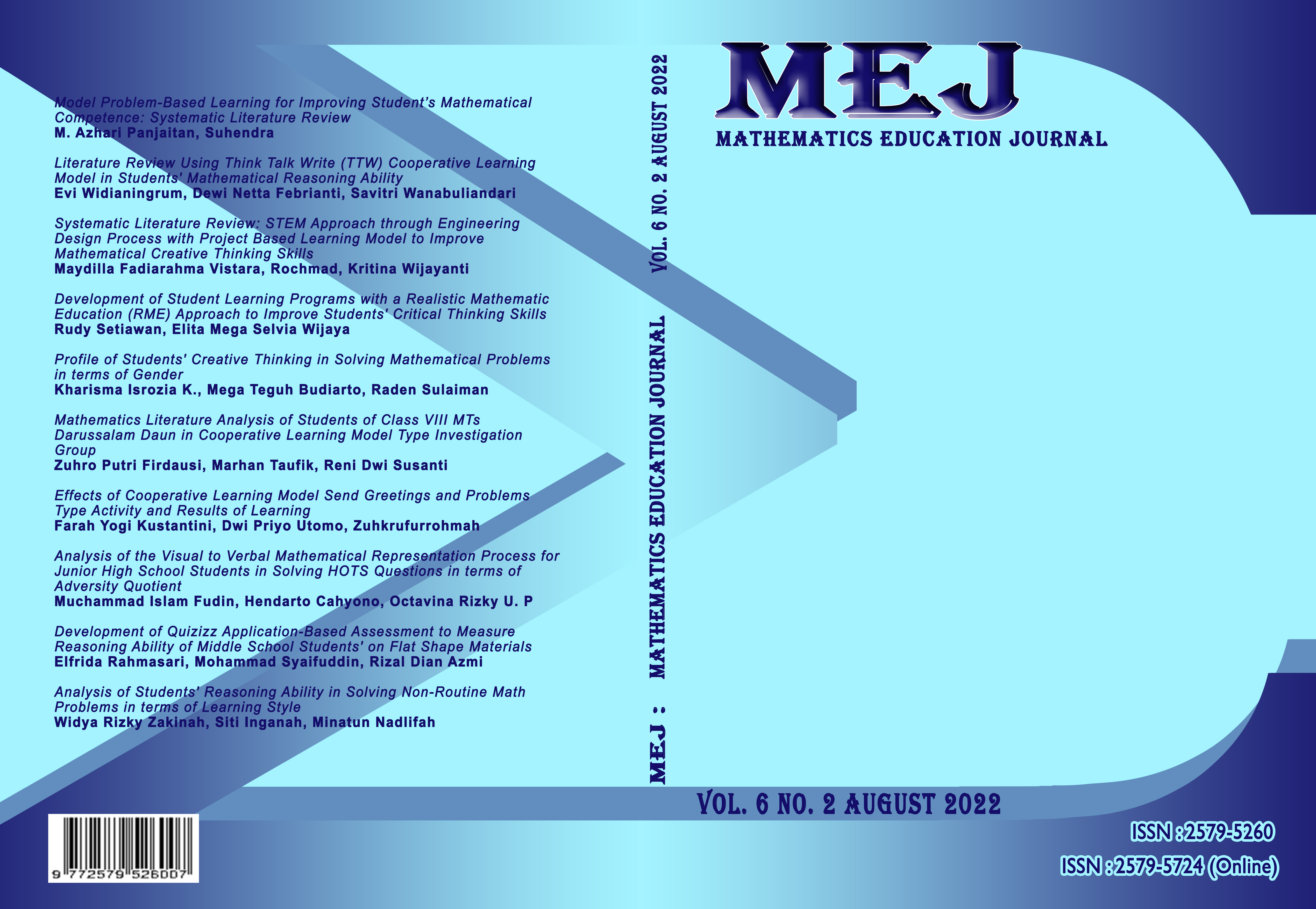Mathematics Literature Analysis of Students of Class VIII MTs Darussalam Daun in Cooperative Learning Model Type Investigation Group
DOI:
https://doi.org/10.22219/mej.v6i2.22680Abstract
This study aims to determine the extent of mathematical literacy skills by applying the Group Investigation type of cooperative learning model. Mathematics literacy achievement in Indonesia is still low, as seen in the PISA and TIMSS surveys, and one of the private junior high schools in Malang learning mathematics is still using conventional learning. The research method is qualitative research with a descriptive approach with nine students as the subject. The results showed that observations of teacher activities at the first meeting were 91.6% very good and the second meeting 97% very good too, observation of student activities at the first meeting 87.5% was very good and the second meeting 93.8% with very good predicates. Then the data from the student response questionnaire on the application of the GI model is an average of 4, 1, which has a good predicate. In addition, the results of the essay test to measure students' literacy skills in the application of the GI model for two meetings showed poor results at the first meeting because there were 2 students who had moderate percentage predicate, while the mathematical literacy ability of students in the second meeting was better because 7 out of 9 students with very high predicate and others with a high predicate. The data obtained based on the results of observations of teacher and student activities, student response questionnaires, and essay test results indicate that the mathematical literacy of Class VIII MTs Darussalam Daun students in the application of the Group Investigation type cooperative model has been successful and effective so that students' mathematical literacy skills are better than meeting First because most students get a very high predicate.
Downloads
References
Fahrunnisa, WSBT (2016). Application Of The Card Sort Learning Model To Improve Integrated Ips Students' Learning Outcomes For Class Vii Smpn 7 Banda Aceh. Geography Education Student Science FKIP Unsyiah, I, 193–202. https://doi.org/10.1007/s11139-020-00300-y
Hartoto, T. (2016). Group Investigation (Gi) Type Cooperative Learning Model Improves Historical Learning Activities And Outcomes. 4.
Hija, A., Nirawati, R., & Prihatiningtyas, NC (2016). The Influence of Group Investigation (GI) Learning Model on Students' Mathematical Problem Solving Ability in Class X Mathematics and Natural Sciences Opportunity Material. JPMI (Journal of Indonesian Mathematics Education), 1(1), 25. https://doi.org/10.26737/jpmi.v1i1.79
Kusniati, I. (2018). Analysis Of Mathematic Literature Ability Of Students Through The Solution Of Algebral Expression Questions In Smp Negeri 1 Lambu Kibang.
OECD. (2017). PISA for Development Assessment and Analytical Framework. https://doi.org/10.1787/9789264305274-en
Ojose, B. (2011). Mathematics literacy : are we able to put the mathematics we learn into everyday use? Journal of Mathematics Education, 4(1), 89–100.
Pakpahan, R. (2017). Factors Influencing Indonesian Students' Achievement in Mathematical Literacy in Pisa 2012. Journal of Education and Culture, 1(3), 331. https://doi.org/10.24832/jpnk.v1i3.496
Siti Khoirunisyah, Eko Purwanti, PY (2017). The Effectiveness of the Group Investigation Learning Model on Social Studies Learning Outcomes. Creative Journal: Journal of Basic Education, 7(1).
Suliah. (2019). The Principal's Strategy To Maximize The Use Of Infrastructure And The Teacher's Role To Improve Quality. March.
Tasyanti, T., Wardono, W., & Rochmad, R. (2018). Analysis of Mathematical Literacy Ability Based on Students' Emotional Intelligence Through Cooperative Learning Model Type of Group Investigation. PRISMA, Proceedings of the National Mathematics Seminar, 1, 334–346.
Wardono, & Mariani, S. (2014). Assessment To Improve Mathematics Literacy. International Journal of Education and Research, 2(7), 361–372.
Widoyoko, EP (2010). Analysis Of The Effect Of Teacher Performance Student Learning Motivation. 1–16.
Downloads
Published
Issue
Section
License
Copyright (c) 2022 Zuhro Putri Firdausi, Marhan Taufik, Reni Dwi Susanti

This work is licensed under a Creative Commons Attribution-ShareAlike 4.0 International License.
Authors who publish with MEJ (Mathematics Education Journal) agree to the following terms:
For all articles published in MEJ, copyright is retained by the authors. Authors give permission to the publisher to announce the work with conditions. When the manuscript is accepted for publication, the authors agree to automatic transfer of the publishing right to the publisher.
Authors retain copyright and grant the journal right of first publication with the work simultaneously licensed under a Creative Commons Attribution-ShareAlike 4.0 International License that allows others to share the work with an acknowledgment of the work's authorship and initial publication in this journal.
Authors are able to enter into separate, additional contractual arrangements for the non-exclusive distribution of the journal's published version of the work (e.g., post it to an institutional repository or publish it in a book), with an acknowledgment of its initial publication in this journal.
Authors are permitted and encouraged to post their work online (e.g., in institutional repositories or on their website) prior to and during the submission process, as it can lead to productive exchanges, as well as earlier and greater citation of published work (See The Effect of Open Access).

This work is licensed under a Creative Commons Attribution-ShareAlike 4.0 International License.










